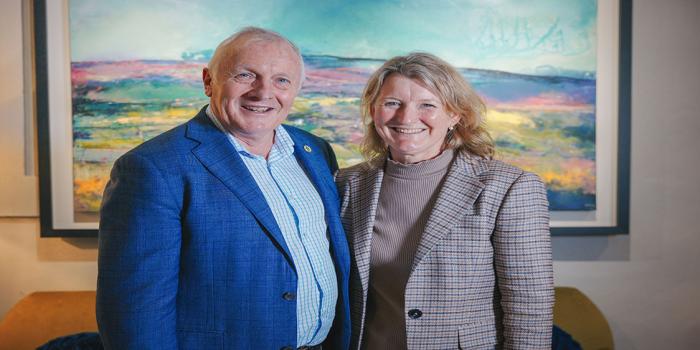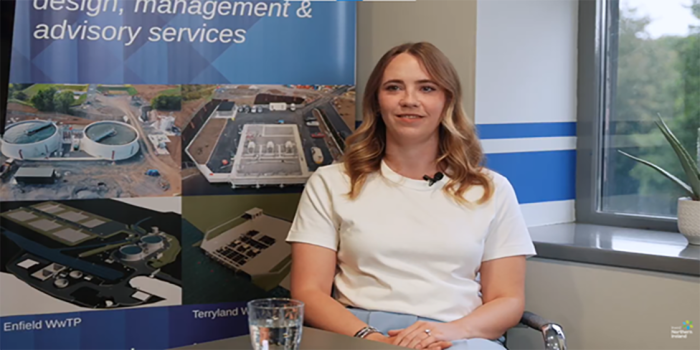Lurgan native Mairead Lavery supporting Canadian Exporters
In January 2019 Jim Carr, Canadian Minister of International Trade Diversification, named Mairead Lavery the president and CEO of Export Development Canada.
Export Development Canada (EDC) provides loans, insurance, advice and other services to Canadian companies seeking international markets for their goods. Founded in 1944, the EDC is a Crown corporation that reports to Parliament through the trade minister. Mairead is the first woman to occupy EDC’s chief executive role in its 75-year history.
Prior to EDC, Mairead held numerous executive roles at Bombardier. During sixteen years, she managed large and complex portfolios, including Finance, Strategy, Business Development and Business Transformation.
We spoke to Mairead about her role as president and CEO of Export Development Canada:
I was born in Antrim and grew up outside Lurgan. I studied Business and Accounting at Queen’s University Belfast, following which I did a diploma in accounting.
My first job was with EY, after 8 years with EY I moved to work with Bombardier in Belfast. In 2000 I was given the opportunity to work at the head office in Montreal, I went for two years on assignment and have stayed in Canada ever since.
In 2014 I moved to EDC as senior vice president for business development responsible for expanding the work of the EDC for Canadian exporters of all sizes in nearly 200 different countries and across all sectors.
I was appointed president and CEO in January 2019. As a new CEO, my role is very busy, I have been working through a plan and have been putting in place changes, in line with my vision for EDC. The challenge has been getting up to speed, as well as driving change in the organisation.
Living in Canada
I miss Northern Ireland but Canada is home to me, I became a Canadian Citizen in 2015. I love the open society, I support diversity and inclusion which is one of the reasons I made Canada home - the sense of a really open society.
Are you connected with other Northern Irish who have made Canada their home?
Yes, I am. I was fortunate to move to Canada with a large corporation – Bombardier. This meant there was a constant 2-way flow of talent between Canada and Northern Ireland. Many of the people who moved around the same time as me remain, close friends, today. Also upon arrival, I joined a number of Irish Societies and this was a great way to get to know others who have made Canada home.
How important are those networks – socially and from a business perspective?
Extremely important, they make integration easier and also can help guide you on the pitfalls as well as the opportunities in your new home.
Do you see parallels in the challenges of the Canadian exporters you support through the EDC, and NI businesses?
Yes, I do. I think the challenges are similar especially for small companies. For those companies, it is having the capacity (Human and Financial) to look for opportunities abroad and then being able to scale to meet demand. Exporting can be complex – language, rules and regulations, different business practices and logistics are some of the challenges. This is true for Northern Irish and Canadian companies.
How important are networks for the companies you work with to enable them to build and expand their businesses?
Very important. Of course, there are different types of networks, technical networks that ensure companies are current on recent developments in a sector, personal networks which help build management capability by establishing a group of peers. Industry associations are also a network of similar companies allowing companies to work together to influence policy. Finally, the network that I help facilitate Canadian exporters which allows Canadian companies to benefit from all the support of the Federal and Provincial Government and helps them build contacts internationally.
The engineering and manufacturing sectors have also seen a significant change in recent years, but from your experience, what do you consider remain Northern Ireland’s core strengths in advanced manufacturing and engineering?
It starts with the education system, the talented workforce that it produces as well as the Research that it performs. Another key strength is problem-solving, commercial success comes from solving customer problems and the advanced manufacturing sector and engineering are investing R&D into tackling difficult problems. This will make their products and services very attractive.
Keeping in touch with home
I try to visit home at least twice a year, my husband is also from Northern Ireland so it’s important to both of us to visit. All my family is in Northern Ireland my mum, brothers and sisters, nieces and nephews, I am the only one who moved away.
It’s much easier now than it was in 2000 to stay in touch thanks to things like WhatsApp, WeeChat and FaceTime. I really miss my family and I really miss being able to see my nephews and nieces growing up.
Visiting Home
I see really significant change when I visit home, there have been big physical changes in the City of Belfast where I studied at University and worked. Society has become much more open and people are looking to the future.





